My first thought when I looked at this collection of icky Helmut Newton-ish photos (and I’m obviously not calling it a rational or reasonable thought) is that Lindsay Lohan is the devil.
Day: December 8, 2009
Meanings
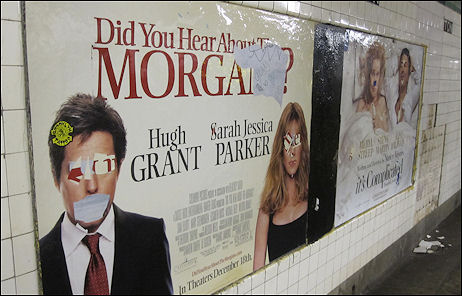
I have this notion that when subway movie posters are trashed before a certain advertised film opens, it means that a certain strata of New York City culture (i.e., youngish, male-ish) has already voted against it due to a resentment of one form or another.

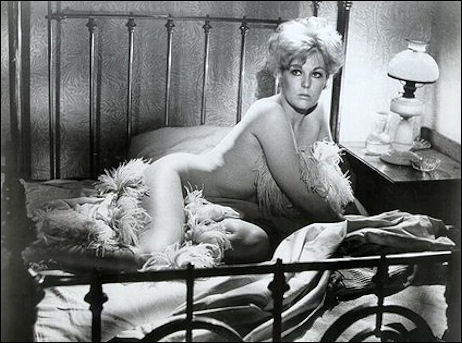
Of Human Bondage
Ploughmen, Poachers and Pickpockets
“While running the risk of displaying weaknesses that Pauline Kael would sneer at, I can think of just one instance of having completely reversed my opinion of a film that I had previously weighed in on in print — Stanley Kubrick‘s Barry Lyndon.
“On first viewing, its overall point and meaning eluded me, and I was not able to appreciate anything beyond its pictorial and musical qualities; it was only on second viewing that its staggering, Stroheimesque stature as a corrosive contemplation of the foolishness of most human endeavor became abundantly clear.” — Variety‘s Todd McCarthy in a 10.11.01 piece called “Some Films Are Worth A Second Look.”
He Stands Alone
I admire In Contention‘s Kris Tapley for sticking his neck out on The Lovely Bones. I have a sense that the Zeligs are turning away from Peter Jackson‘s film but who knows? I’ve got a Lovely Bones screener sitting here, and I intend to watch it again tomorrow.
Tapley had better watch it though. If he isn’t careful he’ll have the rep of someone who just writes about what he likes or greatly respects and therefore isn’t much of an Oscar prognosticator. I’ve had this thrown at me also. All I can say is “Thanks, it means a lot.”
Heartbeat?
Yesterday’s tracking report had Avatar at a 16 first choice. It was at 10 on 11.25 and then 15 on 11.30. Here it is eight days later and it’s only gone up a single point. It needs to be up to 30 or thereabouts by opening day on 12.18. Is it that most people don’t focus on movies they want to see until three or five days before the weekend? I’ve been under the impression that a seriously hot movie always increases its first choice number on a gradual steady basis.
Dougle Digits
The Tiger Woods girlfriend count may be up to ten now. This is becoming more and more hilarious. In fact, the tally may be at 11. The man has become a complete clown, an unintentional farceur, a punchline. His dignity is totally out the window.
Woods is alleged to have said to one of the women that sex goes out of a marriage when kids come along. This isn’t even a fragment of an excuse for catting around but he’s not lying. Any married guy with kids knows the truth of this.
Reminder
Rufus T. Firefly: “Now, what is it that has four pairs of pants, lives in Philadelphia, and it never rains but it pours?” Chicolini: “Thatsa good one. I give you three guesses.” Rufus T. Firefly: “Now let me see. Has four pair of pants, lives in Philadelphia…is it male or female?” Chicolini: “No, I no think so.” Rufus T. Firefly: “Is he dead?”Chicolini: “Who?”
Back When
Roger Ebert chuckled yesterday at the repetitive questions Up In The Air director Jason Reitman has been getting, as illustrated in this pie chart. This moves Ebert to say, “Young Jason, there once was a time — I know you will find this hard to believe — when subjects provided honest answers to such questions. Why, it was within the lifetime of many now living…”
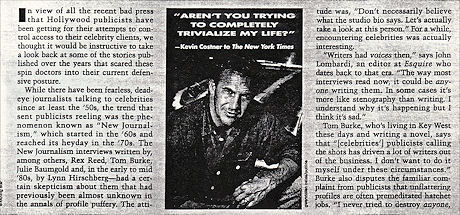
Yeah, I know. There was even a time when journalists asked questions that couldn’t really be categorized, much less put into a pie chart. Every two or three years I get all weepy and sentimental by linking to that 1992 Movieline piece I did about the New Journalism glory days (mid ’60s to early ’80s) called “Ten Interviews That Shook Hollywood.” Some of the better celebrity interviews of this period conveyed, to put it mildly, a certain skepticism — an attitude that said “don’t buy the studio gloss — let’s actually take a look at this person.”
The piece offered summaries of the juiciest celebrity interviews I could find at the time. Among them were Truman Capote vs. Marlon Brando (“The Duke in His Domain,” The New Yorker, November 1957), Rex Reed vs. Warren Beatty (“Will The Real Warren Beatty Please Shut Up?,” Esquire, October 1967), Robin Green vs. Dennis Hopper (“Confessions of a Lesbian Chick,” Rolling Stone, May 1971), Tom Burke vs. Ryan O’Neal (“The Shiek of Malibu,” Esquire, September 1973), and Julie Baumgold vs. David Geffen (“The Winning of Cher,” Esquire, February 1975).
D.C. Crickets Spread It Around
The Washington, DC-Area Film Critics Association announced their winners yesterday and I was looking the other way. Brilliant. Best Film — Up in the Air (Paramount); Best Director — Kathryn Bigelow (The Hurt Locker); Best Actor — George Clooney (Up in the Air); Best Actress — Carey Mulligan (An Education); Best Supporting Actor — Christoph Waltz (Inglourious Basterds); Best Supporting Actress — Mo’Nique (Precious).

Plus: Best Ensemble — The Hurt Locker; Best
Breakthrough Performance — Gabourey Sidibe (Precious); Best Adapted Screenplay — Jason Reitman and Sheldon Turner (Up in the Air); Best Original Screenplay — Quentin Tarantino (Inglourious Basterds); Best Animated Film — Up (Walt Disney & Pixar); Best Foreign Film — Sin Nombre (Focus Features); Best Documentary — Food, Inc. (Magnolia); Best Art Direction — Nine (The Weinstein Company).
Underlined
Envelope/Gold Derby guy Tom O’Neil‘s confirmed this morning that no Oscar glory will be shared by Precious executive producers Oprah Winfrey and Tyler Perry, who climbed aboard in (or after) post-production to give Lee Daniels‘ film a promotional push.
A Lionsgate rep told O’Neil that “the rule is up to three producers get statuettes,” and that “the producers are Lee Daniels, Sarah Siegel-Magness and Gary Magness.”
Mo’Nique-itude
Here’s some front-page attention for a reply I posted earlier this morning to HE reader “alynch” regarding the the current Mo’Nique hoo-hah. Acknowledging my comment that Mo’Nique “sounds obstinate — like someone who’s pointedly not interested in winning, a la George C. Scott or Marlon Brando,” Lynch asked me if I could apply my standards to them as well — i.e., do I believe the Academy should’ve refused to recognize Scott & Brando, since they didn’t care about the award either?
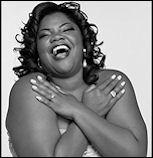
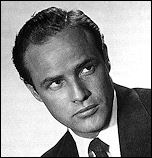

(l. to r.) Monique, Marlon Brando, George C,. Scott
All Academy recognition should ideally be about the work and nothing but, I replied. The reputation of the Oscars rests or falls upon the honoring of quality work, and particularly the perception of honoring great work that has endured over the decades.
It follows that the Academy’s decision to give Best Picture Oscars to Around The World in 80 Days or Driving Miss Daisy doesn’t make the Academy seem all that deep or wise in retrospect. But it does enhance AMPAS’s rep that they gave Best Actor Oscars to George C. Scott for Patton and Marlon Brando for The Godfather, in part because they ignored whatever those guys were saying about the value of an Oscar (i.e., deriding the process, calling it “a meat parade” and whatnot) and just focused on the work.
If people feel that Mo’Nique’s work in Precious is the best female supporting performance they’ve seen all year then they should damn well vote for her regardless of whatever obstinate, politically unfortunate, pretending-to-be-dumb statements she’s made. Never trust the artist — trust the tale.
But there’s a distinction between Mo’Nique has said and what Brando and Scott were reported to have said in the early ’70s. Those guys, it seems, were primarily offended by the lack of dignity in the idea of this or that actor competing for a prize. That I get and respect. It wasn’t a very wise way to look at it, but I get their point and if they wanted to play their cards that way, fine. But I don’t think Brando and Scott pretended to be morons as a way of obscuring their true convictions. And I don’t think either of them ever said, “Okay, I’ll campaign in this and that way, but you gotta show me the money!”
Additional point: The definition of quality work is in the eye of the beholder, of course, but there’s one thing that tends to kick in more than we want to admit — we usually admire good/great performances by good/great actors because we like or admire or enjoy the characters they’re playing.
Everyone loved Brando’s Vito Corleone, especially after that backyard garden scene with Al Pacino and particularly after he stuck that orange peel in his mouth in order to mock-frighten his grandson. And everyone fell for Scott’s rebellious and impolitic Gen. George S. Patton because they saw he was a romantic at heart, especially after he spoke about being a reincarnation of past warriors. And they related to a man who was politically punished — made into a pariah — for standing his ground and simply being who he was and being true to his instincts.
But who in their right mind could love Mo’Nique’s lazy and sadistic welfare mom who makes her daughter’s life a living hell and permits her husband to rape that daughter repeatedly as a way of currying favor with him? It’s one thing to throw your own life away but to systematically torture and poison the life of your child? She’s garbage — arguably the lowest and scummiest character ever portrayed in an Oscar-quality feature.
Daniel Day Lewis‘s oil man in There Will Be Blood was a cold alcoholic monster during the last two scenes (“Bastard in a basket!”), but at least he had the flair and panache to say “I drink your milkshake!” and “I’m finished” at the very end, and at least he showed a tough determination in the early stages of building his oil business and showed a kind of malignant pride in his ability to prevail in a very tough racket. He was a monster but he did it with great style and a sense of perverse contentment about himself. “Good God, look at me! I’m a selfish fiend…and I don’t care all that much that I am, partly because I half-love it!”
But he did love and care for his son in his own way…until he decided to give him up when his son lost his hearing because his ability to help expand Daniel Plainview’s business was lessened, and because he was furious with his son for having started a fire in that cabin. And he did despise Paul Dano‘s religious hustler — I gave him points for that.
The key point is that being an evil person is about what you do to yourself but when you do it to your child, you’ve moved beyond “being” evil to spreading and creating new evils in another person, and an innocent to boot.
The venality in Joe Pesci‘s Goodfellas character or Ben Kingsley‘s in Sexy Beast is confined to themselves — i.e., self-generated and self-directed for the most part. They aren’t injecting their poisons into a kid. Their maliciousness is otherwise directed at certain adults who’ve made the choice of hanging or working with these guys for whatever reason, but they’ve made this choice as adults.
But polluting and destroying a young child is way beyond the realm. A person who does this is truly the keeper of Dante’s Inferno.
Wait A Minute…
Last night I gave an attaboy to amctv’s Bilge Ebiri for noting that Up In The Air is Intolerable Cruelty and vice versa. This morning N.Y. Film Festival honcho (and departing L.A. Weekly critic) Scott Foundas reminded that L.A. Weekly critic Robert Willonsky said the same thing on 12.2.
“Not sure I agree on how ‘big’ Bilge Ebiri’s discovery is vis-a-vis Up in the Air and Intolerable Cruelty,” Foundas writes, “but I know for sure he wasn’t the first one to make it.”
“There is something oddly familiar about Jason Reitman‘s Up in the Air,” Willonsky wrote, “in which George Clooney plays a commitment-phobic business traveler with no use for meaningful human interaction. Could have sworn we’ve been here before. When was it? And where? Oh, yes, of course: Joel and Ethan Coen‘s Intolerable Cruelty, released in the fall of 2003 and forgotten by that year’s first freeze.
“The screwball comedy with a dizzying topspin featured Clooney as Miles Massey, the divorce lawyer who was the love of his own life, till she came along — Catherine Zeta-Jones, that Cinemascope devil in a red dress, who convinced the heartless Miles he had, gulp, soul. Which is why, just as he was set to deliver The Big Speech to a roomful of attorneys about how to gut unhappy couples, Miles stepped up to the microphone, tore up his prepared remarks, and decided, instead, to speak ‘from the heart.’ Poor bastard never knew what hit him.”
